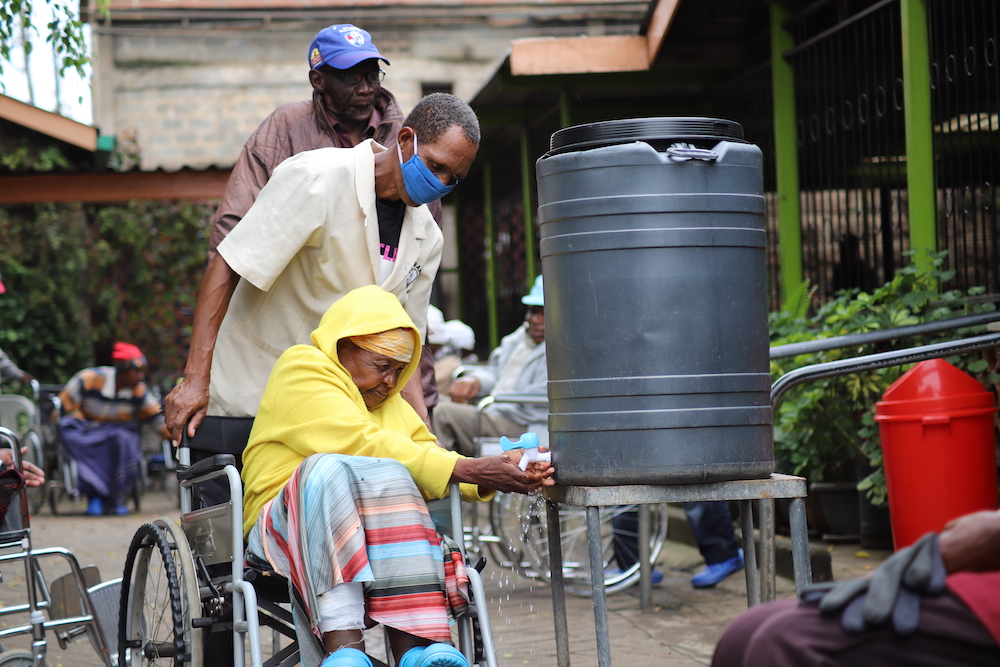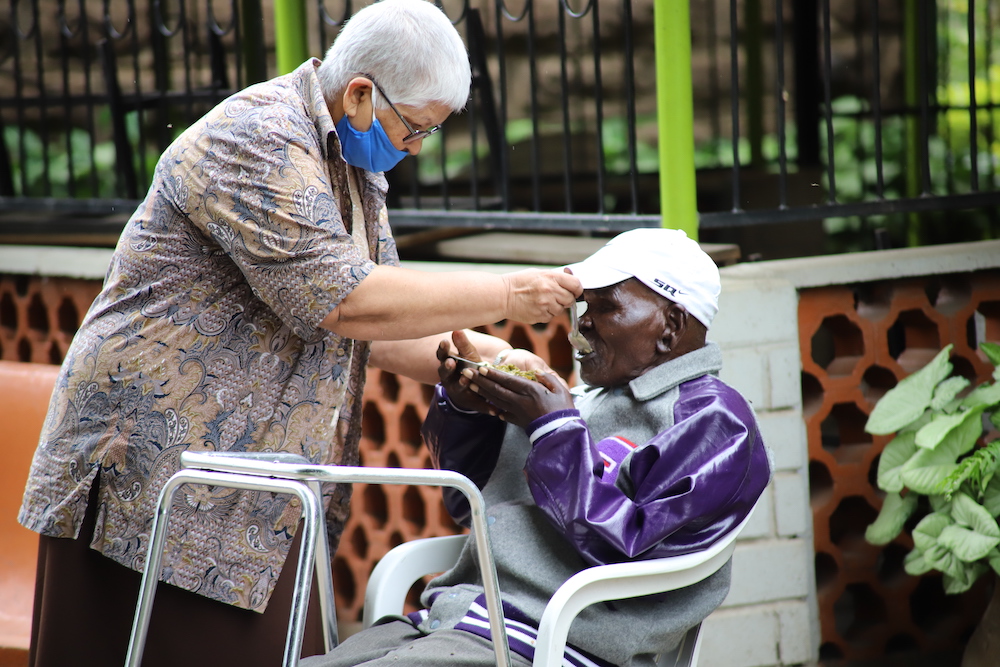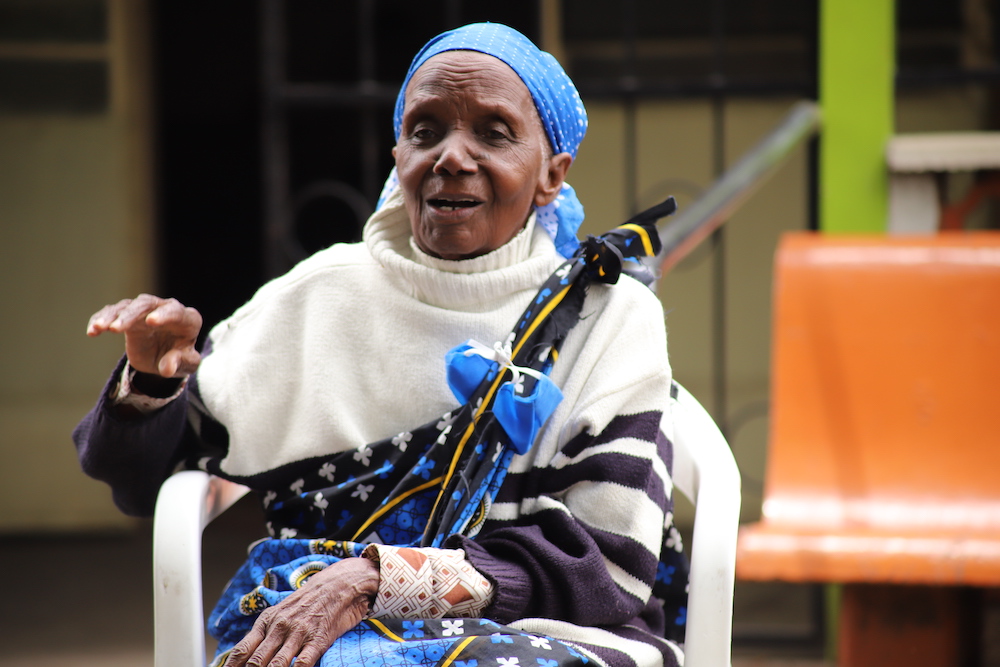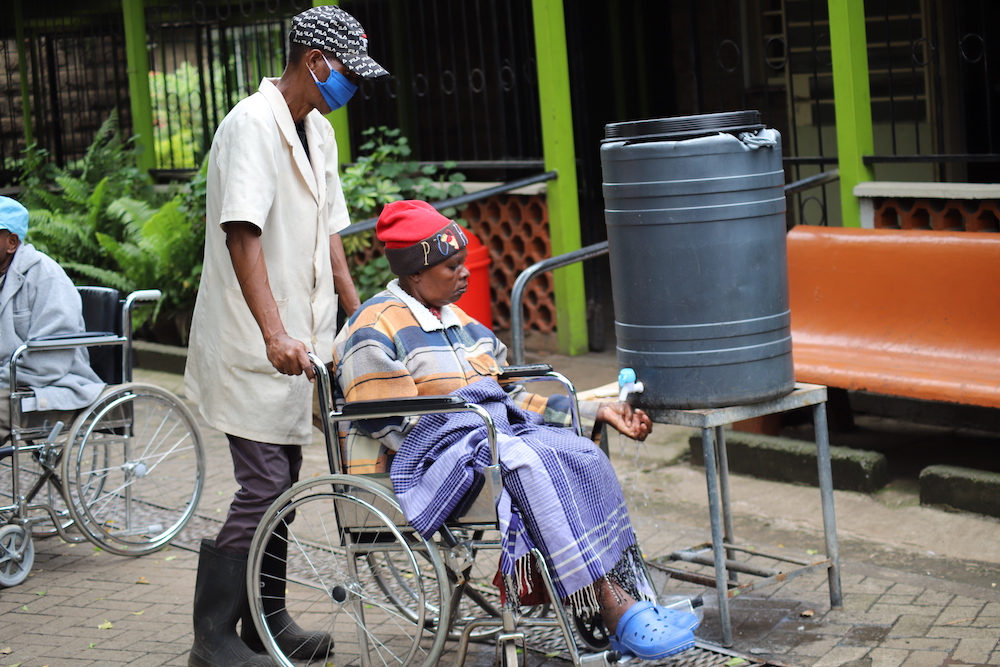
An elderly man washes his hands with soap to protect against coronavirus infection at the Cheshire Home for the Elderly located in the Kariobangi slum outside of Nairobi, Kenya. (Doreen Ajiambo)
Phylis Nyambura sits on a plastic chair, pensive and alone in the shade of a tree at Cheshire Home for the Elderly in the Kariobangi slum northeast of Nairobi. With an effortless click, Nyambura shoots a jet of saliva through the gap between her two front teeth, before she begins to lament how her social life has changed as a result of the COVID-19 outbreak.
"I'm told it's a bad disease that kills old people in minutes," the 80-year-old said in Kikuyu, her native language. "Everyone here is avoiding me. They cannot even allow me to see my daughter and grandson when they come to visit me here. My life has completely changed."
Nyambura, who arrived at the home four years ago, suffers from dementia (loss of cognitive functioning) and behavioral disabilities to such an extent that it interferes with her daily life and activities.
She has been experiencing increased feelings of confusion, paranoia and delusion during the COVID-19 pandemic, which has resulted in 2,862 cases, 85 deaths and 849 recoveries, as of June 9 in Kenya, according to Worldometers, a reference website that provides counters and real-time statistics for diverse topics.
"I don't know what's happening nowadays," said Nyambura, gasping for breath as she struggles to lean on the chair. "We are told to wash our hands all the time, even when we are not eating. I feel very bad, isolated and confused."
Advertisement
The home, run by the Franciscan Missionary Sisters for Africa, used to be a hive of activity. More than 300 men and women of advanced age would meet their relatives and lifelong friends every day. They would share meals and pray together.
But the place is now empty since Kenya has adopted strict measures to counter the spread of COVID-19, the highly infectious respiratory disease caused by the new coronavirus. The government has suspended travel in and out of the country, banned religious and social gatherings, and imposed a nationwide curfew between 7 p.m. and 5 a.m.
In the countrywide fight against the pandemic, the sisters have rolled out a series of strict measures and supportive human services to safeguard the elderly from the virus.
This is because the new disease presents specific risks for older people. Preliminary research from the China Center for Disease Control and Prevention, based on more than 44,000 cases of COVID-19, showed a mortality rate of 2.3% for the general population, rising to 8% in those aged 70 to 79 and nearly 15% in those 80 and over.
"Strict isolation is the only way to protect these elderly men and women," said Sr. Lydia D'sa, who is the administrator of the home. "We have already made changes to provide for social distancing. We told them they could not watch television inside the hall because of space, so they usually watch from outside. Prayers are done outside as well for the sake of distancing."
The home was built in 1980 with the help of HelpAge International to cater for the destitute and homeless elderly members of society. In recent years, however, the home has come under pressure from those who have families but want to be admitted.
Currently, the home is a permanent residence for 40 elderly men and women and has a day care program for about 300 people from the neighboring slum areas, mostly suffering from leprosy, post-polio paralysis and blindness. It provides a two-pronged care program: Those who are weak and feeble who require nursing care reside in the home and those who capable of carrying out their daily personal care taking part of the day care program.

Sr. Lydia D'sa helps an elderly man to eat, a daily routine at Cheshire Home for the Elderly. (Doreen Ajiambo)
D'sa said they have been forced to suspend family members from visiting loved ones to protect elderly residents from dangerous conditions. Dozens of other elderly people in neighboring slums who are on daycare programs have been urged to stay home, she said. They used to come daily for meals, prayers, relaxation and entertainment.
"We have advised the elderly who stay outside the home to only visit at least thrice a week to get parcels of food and clothing to take home," said D'sa, noting that they are not allowed to enter the home and interact with their colleagues. "We understand that they are hungry and need food. Some of them have high blood pressure and need medication."
Visitors bringing donations like food, toiletries and drugs are screened but not allowed to interact with the residents. In some instances they are asked whether they have been coughing or sneezing, have a fever, or have visited a foreign country recently. If the answer is yes, they are asked to leave.
D'sa holds talking sessions daily with the residents, speaking in soft tones about the effects of coronavirus and why they should isolate themselves for now. She invites musicians and experts to highlight symptoms and preventive measures that can help combat the spread of the virus. Hand-washing stations have been installed around the compound as tools to fight the virus.
"Many of the elderly here didn't understand anything about the virus despite watching television," she said. "We started educating them about the coronavirus and the effect, especially on the elderly. We encouraged them to wash hands frequently and always keep themselves clean or else they will get sick."
Health experts are warning younger people about carrying the virus unknowingly to their parents and grandparents, saying older people — especially those with pre-existing conditions —have a much higher risk of dying from the virus.

Phylis Nyambura sits outside the dining hall at Cheshire Home for the Elderly. In the wake of the coronavirus outbreak, the elderly are worried as research shows that the death rate from the illness increases for those aged 50 and over and rises to almost 15% for those in their 80s. (Doreen Ajiambo)
According to 2017 population figures, Kenya has about 1.5 million people 60 and older. This demographic is expected to reach 2.5 million people in 2027.
The rising number of homes for elderly persons across the country caters to the poor elderly and growing number of senior citizens who prefer to spend their sunset years in these facilities rather than stay home alone.
"The disease has proven dangerous for the elderly and people with underlying health conditions because of weak immunity," said Professor Reena Shah, the head of infectious diseases at Aga Khan University Hospital in Nairobi, Kenya.
The World Health Organization is urging everyone to support the elderly during the pandemic, noting that if people aged 60 years old and above are infected, they are more likely to have severe, life-threatening disease, even if their general health is good.
"Supporting and protecting older people living alone in the community is everyone's business," Dr. Hans Henri P. Kluge, World Health Organization regional director for Europe, told journalists at a virtual press briefing on April 3. "I am reminding governments and authorities that all communities must be supported to deliver interventions to ensure older people have what they need. All older people should be treated with respect and dignity during these times. Remember, we leave no one behind."
Reginah Maluki, who is a mental health nurse at the Cheshire Home, said preventing infections is their priority since the virus has already been reported in neighboring slums. Every morning, she measures her temperature, washes her hands carefully, changes into ultraviolet-sterilized work clothes, and wears a mask before taking care of the elderly.
"I have limited my contact with them and distanced myself in an effort to keep them safe," said Maluki, who has worked at the home since 2006. "Every day, I check their health status by measuring temperature, checking their blood pressure, sugar levels for those that are diabetic and also recommend what they should eat and what they shouldn't."
However, Maluki warns that social distancing among the elderly during the coronavirus outbreak could lead to social isolation, already a crisis in the older population. A new Pew Research Center analysis of data from 130 countries and territories reveals that 16% of people aged 60 and above live alone. Loneliness, researchers have established, comes with its own set of health risks.

One of the care staff helps an elderly woman wash her hands at Cheshire Home for the Elderly. (Doreen Ajiambo)
Michael Ndirangu, 75, a resident of the home, is aware of the danger. He has formed a WhatsApp group of friends from neighboring slums to keep in touch during the pandemic. To kill boredom, he has also urged the home to organize common activities for its residents, like playing chess and bingo, having physical exercises and even short plays and skits while maintaining social distance.
"I feel very lonely and I miss my friends who come from neighboring slums to have a chat and play games," said Ndirangu, who was taken from the street by sisters in 2000. "We need to engage ourselves so that we don't feel lonely. It's very risky to our lives."
Nyambura feels social distancing is not an option in times of crisis.
"When will the disease end and life get back to normal?" she asked. "I think we should be allowed to live normally and take temperatures for all guests coming to see us. I miss my daughter and I want see her."
[Doreen Ajiambo is the Africa and Middle East correspondent for Global Sisters Report. Follow her on Twitter: @DoreenAjiambo.]







